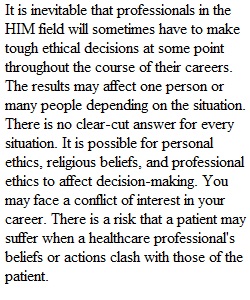


Q Week 13 Check-in 5 (20 points) For this check-in provide thoughtful answers to at least two of the below questions. Provide details and if needed examples and/or research to give depth to each response. Type your answers directly in the course submission area or type out in a document (docx, doc, or pdf) and upload as an attachment in the submission area. 1. What do you think are the most important challenges for the HIM field? Provide details in your response and perhaps supporting research. 2. What is your action plan to maintain your knowledge of HIM once you are working in the field? Provide specifics. 3. How will you or do you show professionalism as an HIM professional? 4. Given the various ways we can communicate today, phone, text, email, webinar call, and face-to-face; what determines the best method to be used in professional work environment? 5. For the topics of communication and professionalism, what are your main areas of concern? For example, personal growth, perception of HIM in the healthcare environment, ongoing changes in healthcare, the lingering impact of the pandemic etc. (Feel free to discussion additional areas not given as examples). How will you navigate and mitigate these concern areas? 6. As an HIM professional how would you advise a co-worker if there was an issue of poor communication or lack of professionalism? PreviousNext
View Related Questions